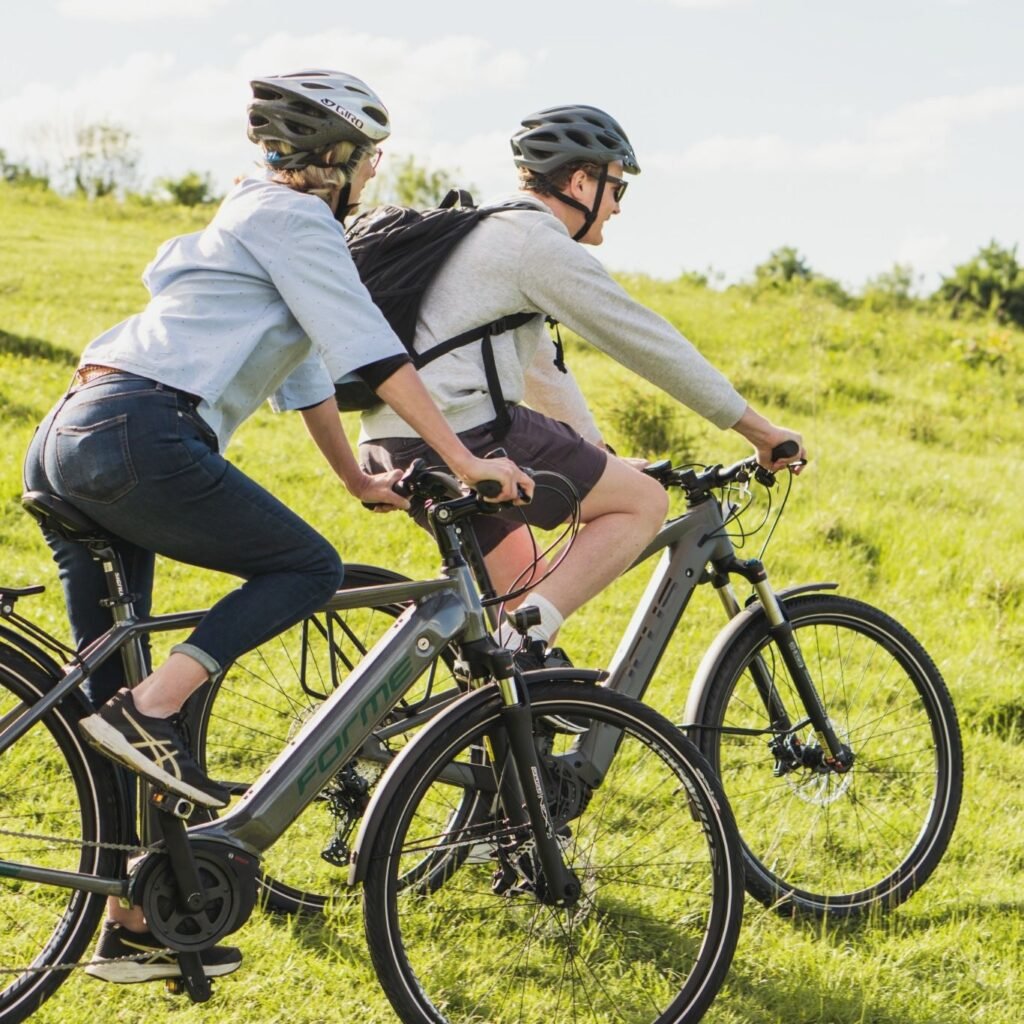We have forged a partnership with a local E-Bike company:
They provide a high quality range of E-Bikes and children’s bike.
There are so many benefits from cycling to your physical and mental health. An E-Bike can offer a great benefit for aiding rehabilitation and as part of your modern lifestyle helping you get out and achieve your goals.
We deal with the other of cycling, when there is an injury so you can keep exercising.
Common injuries
Back pain – overuse, not being bike fit and having the wrong set up on the bike can all cause back pain. – we commonly assess cyclists and we understand the forces and biomechanics of the problems and presentations and can confidently help you back to full health.
Neck pain – often seen more in people who road ride – travelling with your body arched over and neck in full extension so you can see stresses the neck. Treatment will deal with the sore joints, but also a change of seating posture on the bike can really help, raising the front stem or using more upright bars rather than the drop style will help keep you out of this extreme position.
Knee pain – cycling can bring on niggles which have been in the background, commonly the knee cap (patella) may be moving out of alignment causing pain behind the knee cap. Patella tendonitis can also occur or lateral (on the side) from the ITB rubbing. There are many conditions which present and we will deal with them by assessing your biomechanics and working out what the cause of your pain is and dealing with that to avoid reoccurrence.
Hip pain – cycling is very good as it offers fantastic fitness benefits without putting stress through your joints, however hip problems do occur, you may have early arthritis in the hip which responds very well to mobilisation treatment. Impingement at the front aspect of the hip can often cause pain which can be addressed specifically to your presentation.
To reduce the risk of cycling injuries:
Take these simple steps
- Increase your training over time and to avoid straining muscles and joints which aren’t used to the exercise loading.
- Vary your training – changing in loading will reduce the stress on individual areas and will lead to getting fit quicker.
- Listen to your body when you train, easing off when you feel worn out especially if you aren’t fully hydrated, that also means you can push hard when you feel strong.
- Ensure you bike fits you – you can get a bike fitting if you are doing serious mileage, if its just for exercise ensure your seat is set up, remember you’re not Bradley Wiggins and don’t need to be bent fully over to win the tour de Hampshire. An upright riding style removes a lot of the stresses. Ensure the reach on the bike is not overly long.
Riding an e-bike can help with recovery from injury and build strength in weak muscles
It is well known that cycling is a low impact form of training that is kind to your knee and hip joints. It can be hugely beneficial in helping to recover from knee and hip injuries if introduced at the correct time in your recovery and at correct levels of intensity.
However, riding a normal bike is still hard work – and harder work for some than others. This is where an e-bike can have huge benefits. The different levels of assistance an e-bike motor can offer (usually four or five levels) mean that when you are in the early stages of recovery from an injury, you are still able to exercise at a sensible level. You are in control of the level of intensity you exercise at.
As you build strength and recover from your injury, you can use less and less assistance from the motor and ride an e-bike more like a normal bike. In this way an e-bike is a very effective and sensible tool to help with injury recovery.
e-bikes will put a smile on your face and ensure you enjoy cycling a lot more on your journey to return to full strength and fitness.
WIN A FORME EBIKE – The Cycle company are also running a competition to win a brand new E bike – to enter follow the link: https://www.thecyclecompany.co.uk/pages/win-a-forme-trail-bike
If you have a cycling injury seek our advice at an early stage if you develop symptoms. We can address issues much quicker if you don’t let them develop into a chronic problem.
Phillip Wilson is a very keen cyclist, with mountain biking his main passion, though he does have a road bike which gets dusted off for special races. Understanding the demands and biomechanics of cycling helps him focus in and find the cause of your problem and the solution.
Happy cycling
Phillip Wilson MCSP, HCPC, AACP, MSc Inj. SRP
Consultant Physiotherapist
Call us on 01962 714979 to arrange an appointment.

